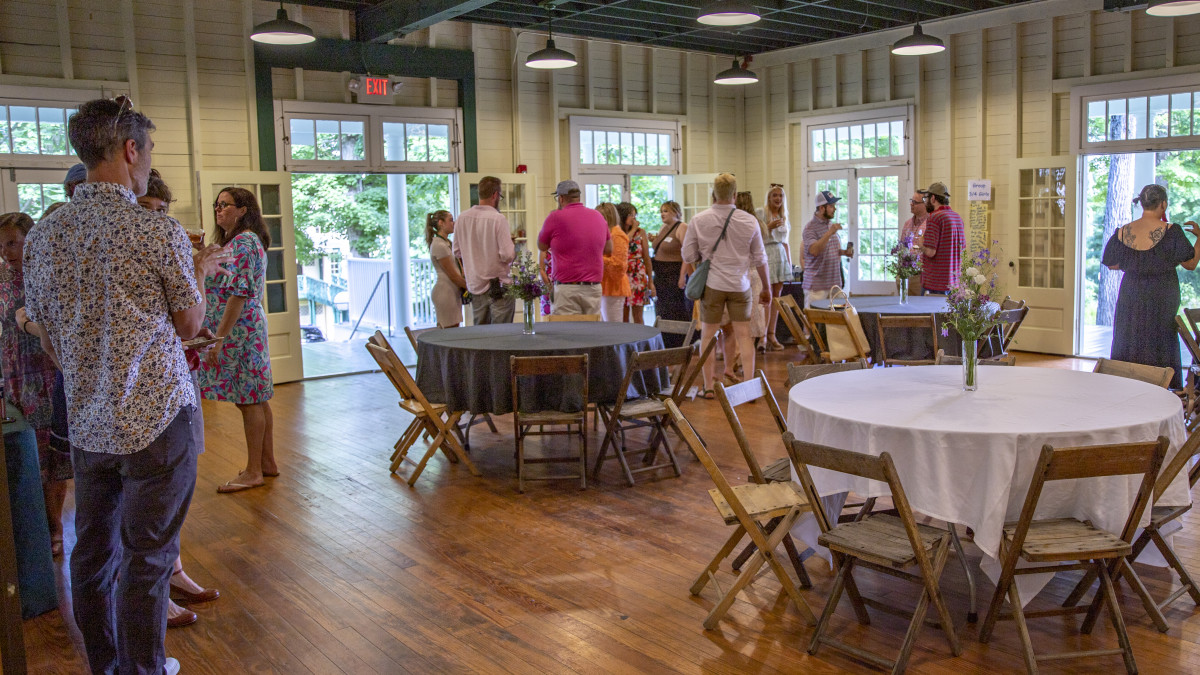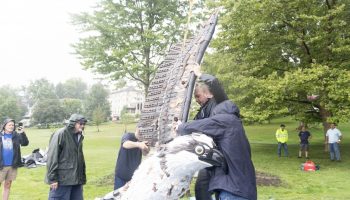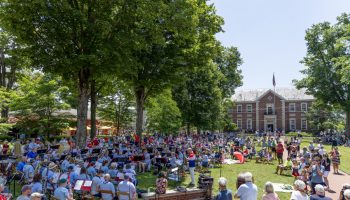In a time of change at Chautauqua and a generational shift around the country, members of the NOW Generation are stepping into their roles of future leadership.
“Your parents or grandparents, people that came before you, have loved on this place, and it’s a reason that we’re able to be here and be so strong,” said Chautauqua Institution President Michael E. Hill to attendees at a reception last Saturday at Girls’ Club. “It’s your turn. It’s your turn to become the heroic people that we hear stories about. It’s your turn to help us dream about what this place is going to look like.”
NOW Gen, which is composed of Chautauquans ages 21 to 40 who want to ensure the Institution’s continued legacy, held its annual welcome reception this summer for the first time since 2019. The reception opened with a welcome from Hill and continued with remarks from Jennifer Stitely, associate vice president of advancement, who introduced a new initiative: one that will pool donations to one program in order to have a stronger impact.
“It’s an opportunity to be connected, to have a bigger impact, and to know that you are working with those that you care about deeply to support programs and initiatives that mean the most to you,” Stitely said.
Stitely opened the floor to a friendly competition between two initiatives: lake management and youth and family programs.
“We would like you to consider supporting one of these, and whatever other programs will mean the most to you,” Stitely said. “We will then be taking up the baton and carrying it across the finish line, or to the next generation.”
Toby Shepherd, Chautauqua Lake project manager, and Alyssa Porter, director of youth and family programs, gave presentations about their respective work. NOW Gen members will vote for which program to pool their funds toward later in the season.
“We collectively have an opportunity to make a lasting impact on the lake. I grew up here, so the lake, for me, is part of that childhood and part of growing up, like learning to swim, fish and sail here,” Shepherd said. “Hopefully a lot of you’ve had that same experience being Chautauquans, and hopefully we want that experience to happen in the next generation, and the next generation. I think the Institution sees the lake as existential to our future.”
Shepherd spoke about why the lake is in danger and how the Institution hopes to begin a science-based comprehensive plan to save it.
“We’re partnering with an organization called the Jefferson Project, which is a collaboration between IBM Research and Rensselaer Polytechnic Institute to bring world-class research to this lake,” Shepherd said. “They have been here in pieces starting in 2020 and last year. … They are coming back this year, and we are working to build, essentially, a smart lake.”
This “smart lake” system will allow for a real-time, detailed report of what is happening in the lake at all times through high frequency sensors and other technological instruments.
“Chautauqua Institution is a great place, but it’s not like we own the entire lake. Why are we doing this ourselves?” Shepherd said. “Well, we’re trying to get the ball rolling, and really use that to reach out to the state, federal and local organizations for support, as well.”
The event then shifted to Porter, who acknowledged the intersection of the lake with youth and family programming. Porter spoke about the continued expansion of this programming, which includes Children’s School, Boys’ and Girls’ Club and the Youth Activities Center, throughout the summer season.
“Underneath (the YAC) now this year, we’re redesigning our young adults program targeting ages 16 to 20,” Porter said. “If you do go by now and see an old-school dorm style thing happening, we can see the potential now.”
The CLSC Young Readers program and STEM initiatives for kids are also expanding this summer. Porter works on overall youth and family experiences on the grounds.
“I really am looking for those moments where we can have more multigenerational experiences, more interdisciplinary experiences,” Porter said. “How are we working with our other departments, like recreation and our lecture platform, to make sure that our youth and families have the best possible experience here and are really getting something that is truly Chautauqua-unique?”
In the coming years, Porter hopes to focus on accessibility and programming enhancements to build a stronger sense of community among Chautauquans.
“Our programs are wonderful and we have this great strong foundation, but they’re not accessible to every young person. As we move forward into 2022 and beyond in a world where we have experienced COVID as a mass disabling event, … we have young people coming out of school shutdowns and dealing with additional stressors that we didn’t have to deal with as kids,” Porter said. “We’re going to need that support to make our programs accessible for everyone so we can continue to build those wonderful memories that many of the people in this room are able to have.”
The event closed with an expression of gratitude to outgoing NOW Gen President Carrie Zachry.
“We do have a changing of the guard, and (Hill has spoken on) continuing to pass the baton. … Carrie has guided us through COVID. She has kept us together,” said NOW Gen Council Member Tally Bevis. “She has rallied the troops on the council, and I’m so grateful to Carrie and for all that she has done.”





